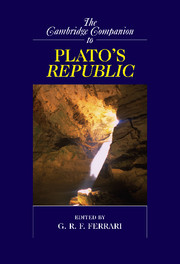Book contents
- Frontmatter
- 1 The Protreptic Rhetoric of the Republic
- 2 The Place of the Republic in Plato’s Political Thought
- 3 Rewriting the Poets in Plato’s Characters
- 4 Wise Guys and Smart Alecks in Republic 1 and 2
- 5 Justice and Virtue: The Republic’s Inquiry into Proper Difference
- 6 The Noble Lie
- 7 The Three-Part Soul
- 8 Eros in the Republic
- 9 The Utopian Character of Plato’s Ideal City
- 10 Philosophy, the Forms, and the Art of Ruling
- 11 Sun and Line: The Role of the Good
- 12 Beginning the “Longer Way”
- 13 The City-Soul Analogy
- 14 The Unhappy Tyrant and the Craft of Inner Rule
- 15 What Is Imitative Poetry and Why Is It Bad?
- 16 The Life-and-Death Journey of the Soul: Interpreting the Myth of Er
- Bibliography
- Index of Passages
- Index of Names and Subjects
- Series List
15 - What Is Imitative Poetry and Why Is It Bad?
Published online by Cambridge University Press: 28 November 2007
- Frontmatter
- 1 The Protreptic Rhetoric of the Republic
- 2 The Place of the Republic in Plato’s Political Thought
- 3 Rewriting the Poets in Plato’s Characters
- 4 Wise Guys and Smart Alecks in Republic 1 and 2
- 5 Justice and Virtue: The Republic’s Inquiry into Proper Difference
- 6 The Noble Lie
- 7 The Three-Part Soul
- 8 Eros in the Republic
- 9 The Utopian Character of Plato’s Ideal City
- 10 Philosophy, the Forms, and the Art of Ruling
- 11 Sun and Line: The Role of the Good
- 12 Beginning the “Longer Way”
- 13 The City-Soul Analogy
- 14 The Unhappy Tyrant and the Craft of Inner Rule
- 15 What Is Imitative Poetry and Why Is It Bad?
- 16 The Life-and-Death Journey of the Soul: Interpreting the Myth of Er
- Bibliography
- Index of Passages
- Index of Names and Subjects
- Series List
Summary
Plato's argument against poetry in Republic 10 is perplexing. He condemns not all poetry, but only “however much of it is imitative [hosē mimētikē]” (595a). A metaphysical charge against certain works of poetry - that they are forms of imitation, “at a third remove from the truth” - is thus used to justify an ethical charge: that these works cripple our thought and corrupt our souls. Unfortunately, it is not at all clear how to understand the connection between the two charges. We can see how they are related in a loose way: imitators are concerned with images far removed from the truth about what they represent (596a-598b); many people are too foolish to distinguish imitation from reality and thus accept ignorant imitators as experts and guides (598c-602b); imitation appeals to and thereby strengthens an inferior part of the soul unconcerned with truth (602c ff.); worst of all, the charms of imitation can seduce even those who generally know better (605c-607a). But when we try to make Book 10's argument more precise, trouble ensues. Plato certainly never spells out the connection between the metaphysics of imitation and the charge of ethical harm. Moreover, he seems in the end (603c ff.) to abandon metaphysical considerations and give a straightforward argument against tragedy and the works of Homer based on their content - they represent people behaving immoderately - and psychological effect: as audience we weep and wail and behave as immoderately as the characters, and this undermines the order of our souls. This argument makes no mention of imitation or ignorance or removes from truth; what, then, is the relevance of the metaphysical charge, to which Plato devotes so much discussion?
- Type
- Chapter
- Information
- The Cambridge Companion to Plato's Republic , pp. 415 - 444Publisher: Cambridge University PressPrint publication year: 2007
- 24
- Cited by

